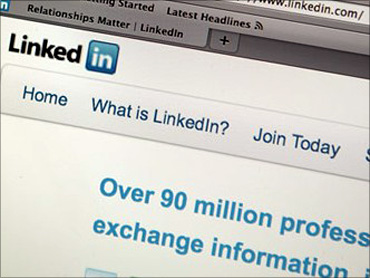 | « Back to article | Print this article |
8 Effective tips to improve your online profile
"I am 24-year old dynamic, hard working, talented software engineer with excellent computing skills."
Although this may read apt for a one-line description of a software engineer, it doesn't say much about the candidate's skills and may not even attract the attention of the prospective employer.
Today, the job market is driven by competition. So, the candidate's profile has to stand apart from a million others who share the same academic qualifications and work profile.
In the last one year, social networking sites like Facebook and Twitter have added an altogether new convenience to users across the globe. At the same time, a large number of job networking sites like LinkedIn, Jobster, Plaxo to name a few, are making things easier for prospective candidates as well as recruiters.
With the boom in technology, a host of user-friendly features and resources have been added to these sites to enhance visibility and better employment opportunities at various levels.
Although the information available can be easily found and shared with prospective employers and employees at the click of a button, social networking is at a nascent stage in countries like India. In fact, a majority of users are unaware about its potential and often fail to use it optimally.
So, what are the common mistakes that people make while updating their profile online? How can you avoid them? Read on.
1. Update profile, ensure profile completeness
Agrees Kailash Shahani, Managing Director, Morpheus Human Consulting Pvt. Ltd. "Candidates who fail to put complete profiles indicate to a hiring manager that the candidate didn't care enough to finish it," he says.
Dixit further suggests, "It is also important to update your skills and achievements from time to time. Profile completeness does not mean only employment/academic chronology. You must also mention other achievements, hobbies, interests, etc."
"Candidates should talk about freelance, contract or part-time work they might be doing, and explain the types of job opportunities you're seeking," adds Shahani.
2. Use recommendations, references wisely
"While having a long list of recommendations may seem like earning you brownie points on a forum like Facebook/Orkut, having too many recommendations on your employee site could be distracting as well.
Display only the best of recommendations on your home page. Mention references only if asked for it," he says.
Click NEXT to continue
3. Check for grammar, typos
Incorrect: I was reponsible for a international research project.
Correct: I was responsible for an international research project.
Similarly, check the use of apostrophes especially when you use 'It has' (it's) or 'It would' (it'd) in your sentences.
Incorrect: Its a highly recommended project in North America.
Correct: It's a highly recommended project in North America.
Check for errors in spelling
Incorrect: My principle duties included...
Correct: My principal duties included...
Nothing turns off an employer than poor language skills.
"Remember, employers check out the candidate's social networking profiles to evaluate their communication skills. Nothing screams poor communication skills and sloppy work louder than bad grammar and incorrect spelling," Kailash Shahani says.
"Take a copy of any resume and I am sure there will be typos and grammatical errors. Some of these errors are unintentional and take place out of lack of proper education, while in other instances, it occurs also when the candidate outsources the contents of his profile externally. No matter how hard pressed the candidate is, it is important that he/she does a spell check on the contents before uploading or sharing his/her profile.
It is equally important to proof read your profile for grammatical errors."
Once updated, share your profile or refer it to your friend or a senior professional who you think will give you an objective feedback on the same. You may also refer to the links below.
Also read: 11 Blunders to avoid in spoken and written English
Part II: Most common blunders in English usage
English bloopers: 'The exams are preponed'
4. Avoid using SMS language
Avoid using abbreviated text in your profile, subject line or in the cover letter email.
"Most of them confuse job sites with fun sites like Facebook and Orkut and end up using sms lingo 'M lookin 4 a job in...' or even in the subject line of emails.
"This is observed commonly among young graduates who are unsure about what they want in life. Using sms lingo instantly shows your callousness towards employment. If you want people to take you seriously, you need to write complete sentences and at the same time say it in crisp powerful words," suggests Ashish Mehra.
Also ensure that you use complete sentences in your cover letter or email.
Incorrect: pls fnd attached my cv
Firstly, this should not be your subject line. If you are using it in the cover letter or cover email, write, "Please find attached my Curriculum Vitae for your perusal."
Incorrect: BSc, BCom, BE
Correct: Bachelor of Science (specialisation), Bachelor of Commerce, Bachelor of Engineering (specialisation)
5. Use keywords
He says, "The world wide web is a vast resource sharing information. Candidates have to ensure that their social networking profiles are complete and rich with search-engine friendly keywords. Having search engine-friendly keywords that describe your skills and experience helps employers find you before they've posted a job ad."
For example, in the case of a candidate from IT field, keywords would be programs he specialises in like C++, Java, Visual Basics, etc.
For an art designer, keywords would be Photoshop, Corel Draw, Flash and the like.
Keywords could also be your educational qualification, namely -- post graduation, masters, diploma, mechanical engineer, or other soft skills you specialise in, like negotiation skills, communication skills, etc. One of the best ways to find out keywords would be to check the requirements on the job profile listed on various websites. Find out if you have included them in your profile.
It is important that you highlight these keywords in your profile. Keywords are essentially skills and achievements that will attract the employer's attention to your profile.
6. User-specific URLs
In the world of social networking, having an exclusive URL or domain name is almost everything and adds a lot of importance to your profile.
"Facebook and LinkedIn let users create URLs for their profile pages that include their names. It makes your profiles more search engine-friendly.
If a hiring manager types your name into a search engine, your Facebook or LinkedIn profile with your name in your URL will have higher prominence in search results. Also, list these URLs on your cover letters, resumes and business cards," says Kailash Shahani.
For example, having a LinkedIn profile with the URL http://www.linkedin.com/in/kailash.shahani would be preferable over something like www.linkedin.com/beautifuldeath.
The former would give the employer the impression that the candidate is serious about his career and has taken the time and effort to own a domain name.
These are little things that you need to take care of while creating your social profile.
7. Subscribe to groups
"Candidates should join online groups in their area of expertise. The best groups to join have lots of active members.
Groups allow you to share and validate your expertise. Ask intriguing questions that will spark discussions with other like-minded individuals, and add your two of your own. These groups are a great way of demonstrating who you are professionally," suggests Shahani.
Since I am an HR professional, I subscribe to groups that are leading in the domain of recruitment and people management.
If you are an advertising professional, you will subscribe to groups like agencyfaqs and exchange4media to name a few.
So, find out what the leading groups in your area of interest are and subscribe to them. This will not only enable you with live feeds and provide you frequent updates on your area of interest and work, but at the same time, when an employer visits your profile, he/she will find a featured list of these pages and groups on your profile, thus adding to your chances of employability.
Not convinced? Just try to visit an unknown person's profile on Facebook or LinkedIn. You will see a list of pages and communities that the user has subscribed to. Go back and see what your profile page looks like when visited by an external user. Find out and unsubscribe yourself from pages or groups that are irrelevant to your profile.
8. Integrity of information
Recruiters are very particular about integrity of information provided to them.
"We as recruiters are fully aware of how candidates boast themselves on their profile and when we face them during the interview round, we realise how it all falls flat on the face," says Avinash Dixit.
"Most recruiters are prepared to face such situations and hence, take the candidate's profile with an extra pinch of salt. While keeping all the above in mind, information on the internet is usually inflated. So, be wary of uploading information that is not true to your skills and merit. If the employer finds out the truth, you may end up endorsing a bad impression about you."
Kailash Shahani shares a similar incident, "Once, a candidate had approached us for the profile of an HR consultant. Her CV looked very impressive and we were looking forward to meet her in the interview round. However, when I asked her to explain more about her profile, she did not seem to understand my question and went on talking the next few minutes on an altogether different subject. When I repeated the question to her, she confessed that she did not know much.
We encounter similar situations on a daily basis. This is also because they are not honest about their skills and fear rejection and failure if they displayed their lack of skills. But the truth is, it will eventually be exposed when you face the panellists. There is absolutely getting away."
Chances are, you may be hired for your honesty or be deprived for your dishonesty. The key is to be honest, anyway.








